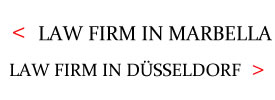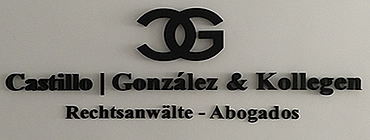- Düsseldorf
- |
- +49 (0) 211 - 163-751-76
- |
- CONTACT PER E-MAIL
- Marbella
- + 34 95 - 108-11-16
- |

- |

- |

Lawyer and Information for Spanish enforcement law
Legal advice on Spanish dunning procedures, enforcement of German or foreign titles in Spain, in particular we advise and represent you on the enforcement of German payment titles in Spain. We also help to find your debtor. Since our Abogados (Spanish lawyers) are admitted to practice before all Spanish courts, we are taking the Spanish enforcement action out of Germany.
You have successfully initiated a payment order against one of your debtors and now want to initiate enforcement? Or, after successfully completing a lawsuit, are you in possession of a judgment ordering the debtor to pay and want to finally see money? Perhaps the first unsuccessful attempt at enforcement occurred some time ago and you know that the debtor has now come back to money? We help you to get your rights and money !
Information on Spanish enforcement law
The enforcement of foreign payment titles (judgments, cost fixing decisions, settlements, etc.) in Spain is based on EU Legislative Decree 44/2001, which entered into force on March 1, 2002. It replaces the Brussels Convention on Jurisdiction and the Enforcement of Judgments in Civil and Commercial Matters of September 27, 1968 and the German-Spanish Treaty of November 14, 1983 on the recognition and enforcement of judgments and settlements and enforceable public documents in Civil and commercial matters. However, EU Legislative Decree 44/2001 only applies to those titles where the corresponding legal proceedings have been initiated after their entry into force. In the case of enforceable documents, it only applies to documents that were created after they came into force. The above provisions continue to apply to old cases. The Lugano Convention of September 16, 1988 still applies to Swiss securities. The following conditions must then be met: The debtor must either be resident in Spain or have the assets to be enforced there. The party wishing to enforce a title must provide a binding copy of the decision. Furthermore, the documents from which it follows that the decision has been enforceable and served under German law must be submitted. In the case of default judgments, it must also be proven that the application has been served to the offending party. According to the text of the legal regulation, the foreign title can be declared enforceable. In practice, enforcement can encounter significant difficulties. First of all, Spanish courts require the submission of all documents in Spanish translation. A lawyer who is admitted to practice in Spain must submit the application for enforcement in writing to the local competent court of first instance. The involvement of a court procurator is also required. In addition to a description of the facts, the brief written by the lawyer and submitted by the procurator also contains a legal justification.
Please note:
The court dealing with the application issues its decision without giving the debtor an opportunity to make a statement in this section of the procedure. If enforcement is permitted in this decision, the debtor can appeal against the decision within one month of being served. As long as the period provided for this runs and as long as the legal remedy has not been decided, the enforcement of the debtor's assets must not go beyond measures to ensure security (such as attachment attachment). From a practical point of view, the actual request for enforcement of the title should first be prepared through investigative measures to determine the debtor's assets. As a rule, checking the land registers, shipping and commercial registers is particularly useful here. If the application for enforcement is granted, information about other assets of the debtor (bank accounts, life insurance) can also be obtained from the court. The execution to be carried out in Spain has been modified by the new Code of Civil Procedure, which came into force on January 7, 2001. According to the new Code of Civil Procedure, the court now requests the debtor to provide information about his or her existing assets. The effectiveness of this measure is guaranteed by a corresponding fine if incorrect or incomplete information is given or if the request is refused.
: Our law firm in Düsseldorf & Marbella represents you throughout Europe :
We also represent you with your concerns and interests in other European countries. Our qualified and competent advice and representation in Spanish and German law means for us that we as German lawyers and Spanish Abogados represent your concerns in Alicante. And always with the necessary persistence and the necessary specialist knowledge and competence. Simply contact us and simply describe your concerns or interests to us.







